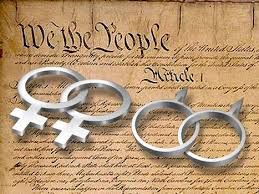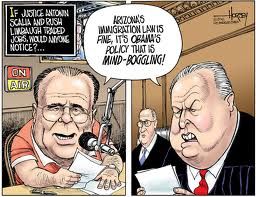Cross posted st The Stars Hollow Gazette
First, this morning House Majority Leader Eric Cantor (R-VA) made the rounds of talk shows spouting how the Affordable Health Care bill can be repealed with a simple majority in the House and Senate since the bill was passed under reconciliation. Without a filibuster proof majority in the Senate, Ryan Lizza at The New Yorker points out the obstacles for that to happen:
Many Republicans, especially in the blog and talk-radio swamps, would cry, “Use reconciliation!” Readers familiar with the congressional debates of 2009-2010 will remember that this procedure allows certain budgetary measures to pass through the Senate with a simple majority. [..]
But reconciliation wouldn’t work here-the process can only be used for policies that have budgetary effects and a C.B.O. score. Much of the A.C.A., such as the insurance exchanges and subsidies, would fall under these categories. But a lot of it, including the hated individual mandate, does not. Repealing the exchanges and subsides without repealing the mandate and the other regulations and cost controls in the law would create a health-care Frankenstein that a President Romney would be rather nuts to support.
That said, the SCOTUS ruling has some rather complex ramifications and Chief Justice Robert’s ruling was rather sly. First was there are the three bit from SCOTUSblog that Lambert Strether pointed out at Corrente:
First, here’s the reasoning:
Essentially, a majority of the Court has accepted the Administration’s backup argument that, as Roberts put it, “the mandate can be regarded as establishing a condition — not owning health insurance — that triggers a tax — the required payment to IRS.” Actually, this was the Administration’s second backup argument: first argument was Commerce Clause, second was Necessary and Proper Clause, and third was as a tax. The third argument won.
Second, here are the implications for the role of the State as we have understood it from the New Deal onward; what Phillip Bobbitt would call a change a Constitutional Order:
The rejection of the Commerce Clause and Nec. and Proper Clause should be understood as a major blow to Congress’s authority to pass social welfare laws.
Third, here is the new Constitutional Order:
Using the tax code — especially in the current political environment — to promote social welfare is going to be a very chancy proposition.
Chancy or not — and it will be the precariat that suffers mischance, and not the elite, in any case — that’s what they’re going to do.
Next from Scarecrow at FDL News Desk who argues that Chief Justice Robert’s “incoherent decision” will “shackle congress” and “screw millions of uninsured:
In the process, he did violence to constitutional law and logic. Consider, for example, Robert’s logic on the “mandate.” In saving the “mandate,” Roberts essentially defined it as not a mandate. You are not really required to purchase insurance, he noted; instead, you may choose not to purchase insurance and instead pay a minor tax. As we know, taxing is just a way to collect revenues, a contribution to the common, aggregate costs of public programs. In this case, the program is paying for many people’s health care through a system of risk/cost sharing.
But if the so-called mandate is not really a mandate but rather an option that can be avoided by paying a tax, and if a legitimate purpose of this tax, as government and amicus briefs argued, is to help cover aggregate costs across a pool of many insured and uninsured people, then what does that do to Robert’s argument about the Commerce Clause? When arguing about the Commerce Clause, Roberts insists it’s a requirement to purchase a “product,” which forces you to take an action, and thus to engage in commerce when you would not otherwise have done that. Regulating “inaction” is not permissible, Roberts argues.
But if, as Roberts concludes, the “mandate” is not a mandate, and the tax’s purpose is to help cover pooled costs, and not to buy a “product,” then there is no “mandate” to purchase a “product.” So no one is forced to engage in commerce as Roberts framed it. Indeed the “commerce” is already there in the risk sharing system across millions of people, all engaged in commerce by paying premiums into a pooled risk scheme. Robert’s entire premise for striking down the Commerce Clause rationale is thus contradicted by his argument about how it’s permissible for Congress to enact a tax to support funding of collective health care costs. That’s what the tax does; but it’s also what paying insurance premiums does.
Roberts’ reasoning on Medicaid is equally illogical. His premise is that Congress cannot expand an existing program administered by states that depends on shared state/federal funding by conditioning funding for the whole program on the states actually implementing the expansion. As Brad DeLong observes, if Congress were just now creating a fully expanded Medicaid, to be implemented by states but mostly paid for by the feds, there would be no question that Congress could condition federal funding on the states actually carrying out the programs. But if the program already exists for half the needy population, Congress cannot complete the program for the other half and use the same leverage to achieve the same degree of state cooperation.
As per the CBO, if the states actually implement the expansion and make an effort to get those eligible to sign up, 16 to 17 million more people will have health care coverage. But without that leverage to get the states to accept Medicaid expansion it leaves the poor between around 50% and 133% of the poverty line in a real no man’s land, because they would both be ineligible for Medicaid AND the coverage subsidies in the exchanges.
As for the states voluntarily opting in for the Medicaid expansion, David Dayen doesn’t think that will happen either, even though the cost for the states would only be responsible for less than 10% of the costs.
And being on the hook for even a small amount of funds isn’t going to make any of these governors happy. Heck, here’s a Democrat, former West Virginia Governor and current Senator Joe Manchin, making the argument for them:
We should all recognize that the health care challenges that many West Virginians and Americans face are not going to go away unless Congress takes additional action to repair this bill. Now that the Court has ruled, we can move forward with fixing what is wrong with this bill and saving what is right. I have always been determined to reduce the burden on states from the Medicaid expansion, and this ruling affirms my position – and makes clear that states must have the flexibility to live within their means by determining Medicaid eligibility as each state sees fit. I have always said one size doesn’t fit all.
That’s going to be a compelling set of logic for a non-trivial number of governors. They’ll also distort how much the expansion would put their states “on the hook.” 26 states sued to eliminate the Affordable Care Act entirely, and they almost got there. Why wouldn’t they jump at the chance to eliminate the portion that creates half of the coverage benefits?
This isn’t going to be universal. New Mexico’s Republican Governor Susanna Martinez, for example, certainly sounds like she’ll take the money. But Southern states in particular, who paradoxically house the citizens most in need of the Medicaid expansion coverage, will be likely resisters at the outset. And it’s not like a lot of success in modern America comes from rallying at the grassroots level for poor and disenfranchised people.
As was noted by Ezra Klein of the Washington Post, opponents of the ACA see this as a win:
“We won,” said Georgetown law professor Randy Barnett, who was perhaps the most influential legal opponent of the Affordable Care Act. “All the arguments that the law professors said were frivolous were affirmed by a majority of the court today. A majority of the court endorsed our constitutional argument about the Commerce Clause and the Necessary and Proper Clause. Yet we end up with the opposite outcome. It’s just weird.”
Yes, it’s weird but so was the whole ACA bill from the very start.


 The Supreme Court ruled on two important cases for the LGBT community: Windsor v. U.S., addressing the
The Supreme Court ruled on two important cases for the LGBT community: Windsor v. U.S., addressing the  In his dissenting opinion on the
In his dissenting opinion on the